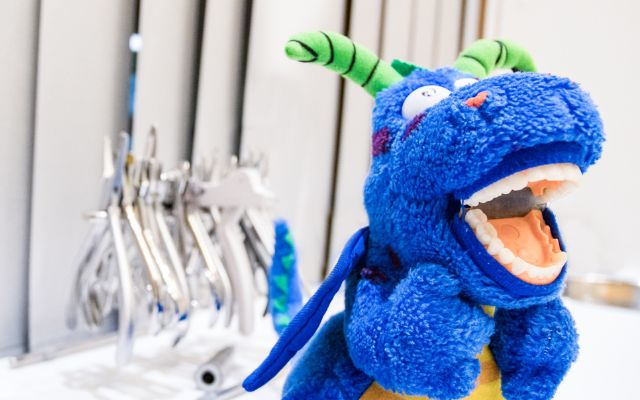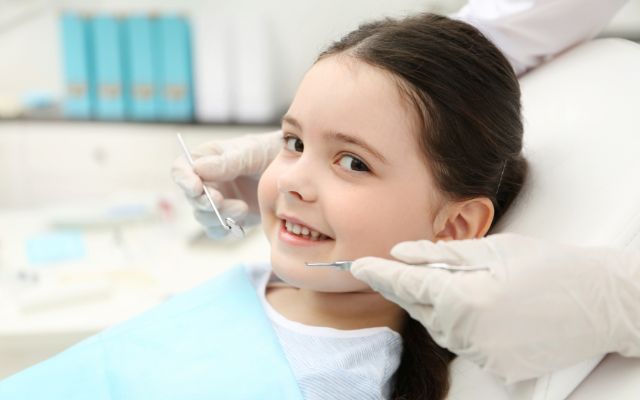When should my child first visit the dentist? It’s easy to assume that until your child has a full set of teeth, there is no need to see the dentist. However, the reality is that dentistry is not solely focused on teeth. It encompasses the health of the gums, lips, and the inside of the mouth. During each and every visit, whether it is for you or your child, your dentist conducts comprehensive preventative checks, examining the entire mouth. That’s why it’s important not to wait too long between visits. Delaying dental appointments would be counterproductive. By scheduling early visits, you ensure that your child’s oral health receives the attention it deserves, setting the stage for a lifetime of healthy smiles.
When Should My Child First Visit The Dentist?

As dental professionals, we recommend following the guidelines set by reputable sources such as the Australian Dental Association (ADA). According to the ADA, it is generally recommended that your child’s first dental visit should take place when their first tooth becomes visible or by the age of 12 months, whichever comes first. This early visit allows the dentist to assess your child’s oral health, provide guidance on proper dental care, and address any concerns you may have as a parent or caregiver. By adhering to these guidelines, you are taking an important step in prioritizing your child’s oral health and setting the foundation for a lifetime of healthy smiles.
Benefits of Early Dental Visits for Children
Early dental visits for children offer a multitude of benefits that contribute to their long-term oral health. By prioritizing these initial visits, you set your child on the path to a lifetime of healthy smiles. Here are the key benefits of early dental visits:
Establishing Positive Dental Experiences
Early visits help familiarize your child with the dental environment, reducing fear and anxiety associated with dental care. By creating positive experiences from the beginning, your child is more likely to develop a lifelong positive attitude towards dental visits.
Introduction to Oral Hygiene Practices: Dental professionals use early visits to educate parents and caregivers about proper oral hygiene practices for children. You will receive valuable guidance on techniques for brushing, flossing, and promoting good oral habits, ensuring your child’s teeth and gums stay healthy.
Assessment of Oral Health Development
Early dental visits allow dentists to monitor your child’s oral health development from an early age. This includes evaluating the eruption of teeth, assessing bite alignment, and identifying any potential issues or abnormalities that may require intervention.
Early Detection and Prevention of Dental Issues
Regular dental check-ups enable early detection of dental problems such as tooth decay, gum disease, and bite irregularities. Detecting issues at their initial stages allows for prompt intervention and preventive measures, minimizing the need for more extensive treatments in the future.
Building a Trusting Relationship
Regular dental visits foster a trusting relationship between your child and the dentist. This bond allows the dentist to provide personalized care tailored to your child’s specific needs, ensuring their comfort and confidence during future visits.
What to Expect During the First Dental Visit?

During your child’s first dental visit, there are several aspects you can expect as part of the appointment. As dental professionals, we strive to make this experience comfortable and informative for both you and your child. Here are the key elements you can anticipate during the first dental visit:
1. Warm Welcome and Child-Friendly Environment
Our dental team understands the importance of creating a welcoming and child-friendly atmosphere. From the moment you arrive, our staff will ensure that your child feels comfortable and at ease.
2. Comprehensive Oral Examination
The dentist will conduct a gentle and thorough oral examination of your child’s mouth. This examination includes evaluating the teeth, gums, bite, and overall oral health. It allows the dentist to assess any existing dental issues or potential concerns.
3. Dental Education and Guidance
The first dental visit is an opportunity for our dental professionals to provide valuable education and guidance regarding your child’s oral health. We will discuss proper brushing and flossing techniques, age-appropriate oral hygiene practices, and nutritional tips to maintain healthy teeth and gums.
4. Preventive Measures and Treatment Recommendations
Based on the examination findings, the dentist may recommend preventive measures such as fluoride treatments or dental sealants to protect your child’s teeth from cavities. If any dental issues are detected, appropriate treatment options will be discussed, ensuring you are well informed about the next steps.
5. Addressing Questions and Concerns
Our dental team is here to address any questions or concerns you may have regarding your child’s oral health. Feel free to discuss topics such as teething, pacifier use, thumb sucking, or any other dental-related inquiries you may have.
6. Establishing a Dental Care Plan
Based on the examination and discussion, the dentist will work with you to create a personalized dental care plan for your child. This plan may include recommendations for future dental visits, specific oral hygiene practices, and guidance on maintaining optimal oral health.
Conclusion
In conclusion, it is recommended that your child’s first dental visit occurs when their first tooth emerges or by the age of 12 months, as advised by reputable sources like the Australian Dental Association (ADA). At Spring Orchid Dental, we specialize in children’s dentistry and offer a comfortable environment for their dental visits. To schedule your child’s first dental visit and learn more about our children’s dentistry services, please visit Children Dentistry. Contact Spring Orchid Dental in Bassendean, Perth, to prioritize your child’s oral health and ensure a lifetime of healthy smiles.
FAQs
When should I take my baby to the dentist Perth?
Around their first tooth eruption or by the age of 12 months, whichever comes first.
What is the age guide for teeth?
| Age Range | Teeth Development |
|---|---|
| 6-10 months | First lower and upper central incisors |
| 9-13 months | Upper and lower lateral incisors |
| 13-19 months | First molars and canines |
| 16-22 months | Lower second molars |
| 25-33 months | Upper second molars |
| 2-3 years | Complete set of primary (baby) teeth |
How many times kids brush teeth?
Kids should brush their teeth at least twice a day.





